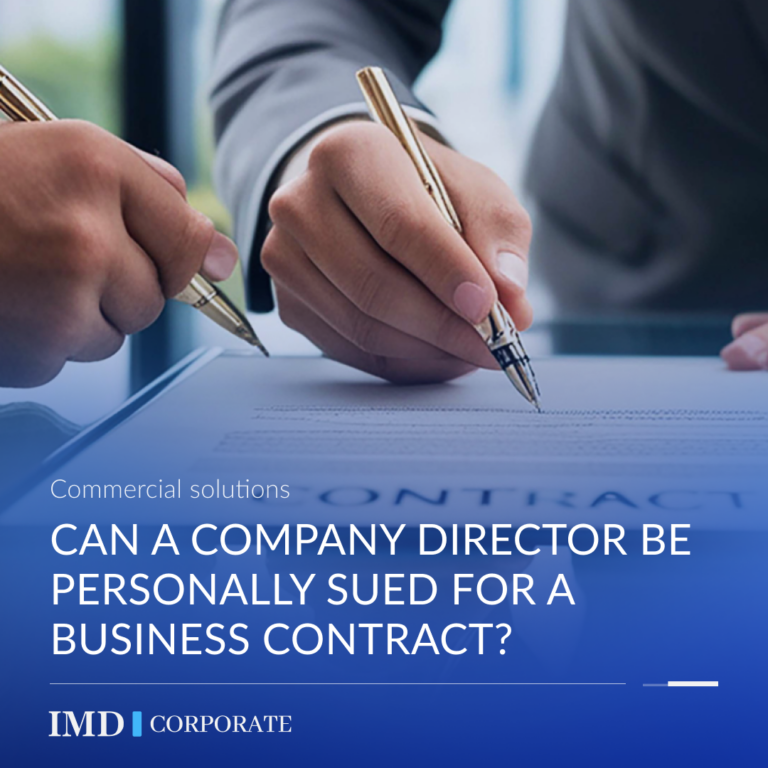Get in touch with our resolution solicitors in the UK and call us on 0330 107 0106 to arrange a free no-obligation call or request a free quote.
Many business owners are unsure whether a company director can be personally liable for breaches of a business contract. A recent dispute handled by IMD Corporate shows how misunderstanding legal standing and the Civil Procedure Rules can lead to unnecessary litigation and avoidable legal costs. The case involved two private limited companies — a restaurant in the hospitality sector (Company A) and a construction firm (Company B) — and centred on one key issue: who was the correct party to issue court proceedings against. The absence of a written contract and confusion over corporate legal identity led to litigation that could have been avoided through correct procedural steps.
Background
The parties agreed verbally for renovation works at a restaurant in London. All invoices were issued by the Company B to tCompany A. Both entities were private limited companies, each managed by a sole director who oversaw the arrangement.
As the project continued, disagreements arose concerning delays, additional costs for labour and materials, and delayed payments. Believing that excess payments had been made, the Company A’s director (Claimant) issued a claim personally against the Company B’s director (Defendant), rather than the company itself. The claim was brought in the individual’s name, not the name of the corporate entity. Acting without legal representation, the Claimant assumed that personal dealings between the directors were sufficient to establish liability.
Legal Analysis
Separate Legal Personality
This matter centred on a core principle of company law — that a company is a separate legal entity from its shareholders and directors. The principle established in Salomon v A Salomon & Co Ltd (1897) AC 22 confirms that companies hold their own rights and liabilities. Contractual obligations exist between companies themselves, not between the individuals managing them.
All invoices and commercial correspondence in this case were issued between the companies. The directors, although directly involved in negotiations, were not personal parties to the contract. Any legal action should therefore have been taken between the two companies, not against the directors in their personal capacities.
Procedural Compliance and Legal Standing
When IMD Corporate was instructed to represent the Defendant , the firm chose not to file a defence but to apply for a strike out of the claim. The basis of the application was that the Claimant lacked legal standing, and the named Defendant was not the party in this matter.
Under CPR 3.4(2), the court may strike out a claim that discloses no reasonable grounds for bringing proceedings or constitutes an abuse of process. In this instance, the claim was procedurally defective from the outset because the contractual relationship existed only between the two corporate entities. Commencing proceedings in an incorrect legal capacity rendered the claim invalid.
The court accepted IMD Corporate’s submission and ordered the claim to be struck out. . The Claimant became liable for the Defendant’s costs arising from the incorrectly issued proceedings.
Cost Efficiency and Strategic Decision-Making
The decision to pursue a strike out rather than prepare a full defence and proceed to trial provided a time- and cost-efficient resolution. Addressing the procedural defect at an early stage prevented unnecessary expense and limited the disruption to the client’s business operations.
Commercial disputes of this nature often arise where directors of small private companies do not fully distinguish between personal and corporate legal identities. Issuing a claim in the wrong name can result in wasted costs, adverse cost orders, and loss of time. The outcome demonstrates that attention to procedural accuracy is a practical requirement in commercial litigation.
Key ideas
- Verify the Correct Legal Entity
Before issuing proceedings, confirm the identity of the contracting parties. The claimant and defendant must reflect the entities that formed the contract. A claim brought in an incorrect name is invalid and may result in an order for costs. - Comply with the Civil Procedure Rules
The Civil Procedure Rules establish the procedural framework for litigation. Failure to comply can result in a claim being struck out and adverse cost consequences. - Seek Legal Advice Early
Directors should seek independent legal advice before issuing proceedings. Early assessment helps identify procedural risks and prevents errors that can invalidate a claim.
Conclusion
This matter demonstrates the operational importance of procedural accuracy and legal standing in commercial dispute resolution. The court’s decision to strike out the claim confirmed that only the correct legal entity may bring or defend proceedings.
For businesses involved in commercial agreements, especially where directors participate directly in management, it is necessary to ensure that all contractual and procedural steps are taken in the name of the company. Failure to do so may result in unenforceable claims and cost exposure.
IMD Corporate continues to advise clients across the construction, hospitality, and corporate sectors, ensuring that compliance with the Civil Procedure Rules and precise identification of legal entities remain central to every dispute strategy.
This article is for general information only and does not constitute legal or professional advice. Please note that the law may have changed since this article was published.
To find out more about our services, visit Commercial solutions section of our website.
Call us now to discuss your case 0330 107 0106 or email us at business@imd.co.uk.
This article was created by Aleksandra Nowicka – Solicitor

